
Publisher:
Bonnie King
CONTACT:
Newsroom@Salem-news.com
Advertising:
Adsales@Salem-news.com

~Truth~
~Justice~
~Peace~
TJP
Dec-05-2009 21:30

 TweetFollow @OregonNews
TweetFollow @OregonNews
Through a Glass Darkly: The Elite Perspective on Bolivian Democracy
Ersun Warnke Salem-News.com Business/Economy ReporterThe NY Times takes cheap shots at a President whose politics may more closely resemble democracy, than our own.
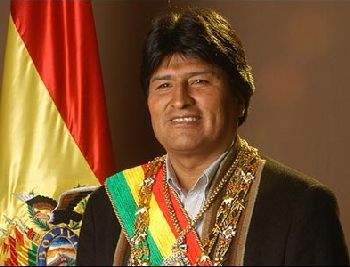 President Evo Morales of Bolivia Courtesy: pflp.ps |
(EUGENE, Ore.) - In this article I must take a detour from my normal reporting and instead comment on an article written in the New York Times. (see: In Bolivia, a Force for Change Endures)
This article deals with the imminent reelection of President Evo Morales of Bolivia.
Background
Evo Morales is one of the most important political leaders to ever arise in the places once colonized by the European world. He is one of a very few indigenous peoples to ever be elected to executive office under the European colonial political structure.
He is especially unique in that, unlike Patrice Lumumba of the Congo, he has not been assassinated.
Evo Morales visited the United States a couple of years ago. The only television programs that invited this historic leader to speak were the Daily Show and Democracy Now.
That may be because he doesn’t speak English. Or because the people who run the broadcast media didn’t want to hear what he had to say. They could be the same thing.
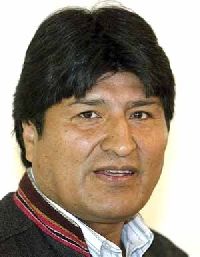 Morales courtesy: sydwalker.info |
Evo Morales is intensely disliked by business and government in the U.S. and Europe for several reasons: he nationalized Bolivia’s natural gas industry; he refuses to support the “war on drugs” and actively supports the cultivation of coca for medicinal purposes, while actively resisting cultivations for refinement of cocaine and export; and he has supported limited land redistribution.
When Morales nationalized the natural gas industry the western business media, especially the Economist, predicted every kind of calamity for Bolivia if they took control of their own resources.
The nationalization went forward and natural gas production increased, and revenues for the people of Bolivia increased dramatically. None of the horror stories of flight of capital or international ostracism came to pass.
Natural gas is a valuable resource. The international community would prefer to extract it on unfair terms, but they still need it, even if they have to pay a fair price. Morales called the bluff of the international capital and energy cartels. They would prefer to bury that fact, and do everything possible to discredit Morales. Morales’s position on coca, the raw plant from which cocaine is extracted, is contrary to the official U.S. “war on drugs.”
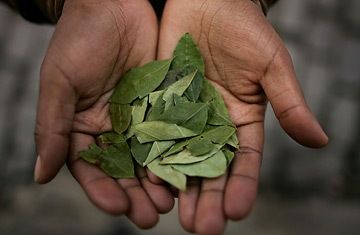 Coca plant, courtesy: latinamericanmusings.files.wordpress.com |
Coca has long been used as an herbal remedy in Bolivia and other South American countries. Morales argues that it is unjust to ban the growing of a beneficial plant in one country just because another country has a drug abuse problem.
Under Morales, Bolivia has refused to ban coca cultivation for traditional domestic use.
Columbia, where coca cultivation is illegal, is the primary source of refined cocaine entering the U.S. Columbia is one of the closest allies of the U.S. in South America and a major recipient of U.S. military aid.
In 2008, Morales expelled the DEA from Bolivia, accusing them of being involved in espionage and fomenting violence. [How exactly does the DEA have jurisdiction in Bolivia? Yeah…] Morales’s land redistribution scheme is another point of soreness with the international community. Challenging the “rights” of Europeans to the most productive land in every corner of the globe is usually grounds for extermination.
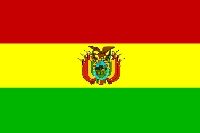
The constitutional amendment on land ownership, passed by popular referendum, limited private land ownership to 5000 hectares, or 12,355 acres [19 square miles … a whole lot of land for one person to own]. It did not take land from anyone. It only set limits on future purchases.
This perfectly reasonable democratic initiative, which was actually quite timid, was reported in the European press as if the sky were falling.
The elite view of Bolivia, and everywhere else, is that democracy is only valid if the outcomes of the democratic system can be manipulated to serve the interests of the elite.
When democratic governments occasionally go off the rails, and actually begin to serve the interests of society as a whole, this is a violation of the basic principle on which they were created.
The New York Times on the Re-Election of Evo Morales
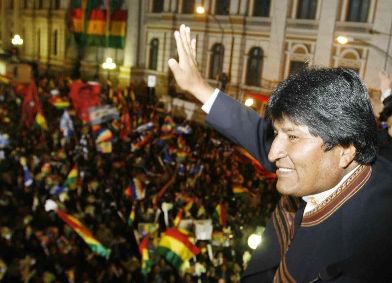 Courtesy: 21stcenturysocialism.com |
Sentence one: The slogans and posters of Che Guevara notwithstanding, this is not Havana circa 1969, nor Managua, 1979.
Well, we are off to a good start on prejudicial use of irrelevant and unsupported context.
[Morales’s] dominance has earned him some unexpected rivals, beyond the opposition he faces from traditional elites in the rebellious eastern lowlands. His broadening influence also feels oppressive to an array of indigenous politicians struggling to emerge from his shadow. Yes, the New York Times has been able to find some people willing to criticize the president of a country.
Remarkable accomplishment, and totally news worthy.
“This government exists to spend money on Evo’s campaigns at the expense of the rest of us,” said Felipe Quispe, 67, an Aymara Indian who entered politics after leading a guerrilla insurgency in the 1980s and being imprisoned in the 1990s. “Evo is an Indian dressed in fancy clothing, surrounded by white men and mestizos.”
Totally unsupported allegations with no factual context from a former violent criminal, or “terrorist” in the parlance of Washington.
You just can’t beat the balance provided by objective journalism.
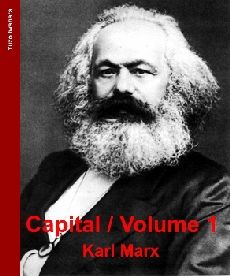
“Evo himself,” said Mr. Calla, the anthropologist, “could be considered the authoritarian left.” Ricardo Calla was, according to the article, the Minister of Indigenous Affairs in a previous administration. He is a European, and earned his bachelors degree in the United States at Washington and Lee University.
Not exactly the least biased source available.
Posted on a door [at Indigenous University Túpac Katari], a note says that it is compulsory for academic and administrative staff members to attend a crash course on “Capital” by Karl Marx; sanctions loom if they do not attend.
Some more not-so-subtle allusions to a non-existent communist connection. Talk about fighting a dead war. And it was a fake war to start with!
Karl Marx’s Capital is required reading for all serious economists by the way. It is one of the most important expositions of market theory in the history of economics.
The conclusion: “What was brought by the European invasion and the colonial system?” asked David Quispe, 37, who teaches a course on the Andean worldview.
“The capitalist and racist exploitation!” a group of students answers in unison, grasping their textbook, “Indian Thesis” by Fausto Reinaga.
“Here young Indians are used to being silent,” Mr. Quispe said after class. “This is their time to start talking.”
===================================
 Salem-News.com Business/Economy Reporter Ersun Warncke is a native Oregonian. He has a degree in Economics from Portland State University and studied Law at University of Oregon. At a young age, his career spans a wide variety of fields, from fast food, to union labor, to computer programming. He has published works concerning economics, business, government, and media on blogs for several years. He currently works as an independent software designer specializing in web based applications, open source software, and peer-to-peer (P2P) applications. Ersun describes his writing as being "in the language of the boardroom from the perspective of the shop floor." He adds that "he has no education in journalism other than reading Hunter S. Thompson." But along with life comes the real experience that indeed creates quality writers. Right now, every detail that can help the general public get ahead in life financially, is of paramount importance. You can write to Ersun at: warncke@comcast.net
Salem-News.com Business/Economy Reporter Ersun Warncke is a native Oregonian. He has a degree in Economics from Portland State University and studied Law at University of Oregon. At a young age, his career spans a wide variety of fields, from fast food, to union labor, to computer programming. He has published works concerning economics, business, government, and media on blogs for several years. He currently works as an independent software designer specializing in web based applications, open source software, and peer-to-peer (P2P) applications. Ersun describes his writing as being "in the language of the boardroom from the perspective of the shop floor." He adds that "he has no education in journalism other than reading Hunter S. Thompson." But along with life comes the real experience that indeed creates quality writers. Right now, every detail that can help the general public get ahead in life financially, is of paramount importance. You can write to Ersun at: warncke@comcast.net
Articles for December 4, 2009 | Articles for December 5, 2009 | Articles for December 6, 2009

Salem-News.com:
googlec507860f6901db00.html



Terms of Service | Privacy Policy
All comments and messages are approved by people and self promotional links or unacceptable comments are denied.
Mike December 7, 2009 5:30 am (Pacific time)
I have lived in Latin America, we need more of this type of excellent reporting thank-you
Reid December 6, 2009 1:28 pm (Pacific time)
Unique means one of a kind; one cannot be 'especially unique' in any respect. More to the point, there's nothing wrong with having people with different perspectives comment on the situation in Bolivia. I think there's a legitimate debate to be had about Evo that is ill-served by oversimplification by either side.
Ersum Warncke December 6, 2009 12:43 pm (Pacific time)
I have not traveled in Bolivia, but I have tried to inform myself as best as possible through the internet and media. More importantly for the purposes of this article: I can pick out and highlight the ways "objective" journalist build their biases into their pieces.
Daniel Johnson December 6, 2009 12:05 pm (Pacific time)
There is no mention of the CIA anywhere in both articles. I find that ominous.
djwildlands December 6, 2009 8:37 am (Pacific time)
From my perspective and that is from someone who has traveled and spent time in Bolivia and closely follows events in that country, I find this article and analysis to be accurate and right on. Most U.S. media, including the NYTimes, have no idea of the dynamics and importance of the change sweeping Bolivia. Kudos to Mr. Warnke and Salem-News.com for publishing the real story.
[Return to Top]©2025 Salem-News.com. All opinions expressed in this article are those of the author and do not necessarily reflect those of Salem-News.com.